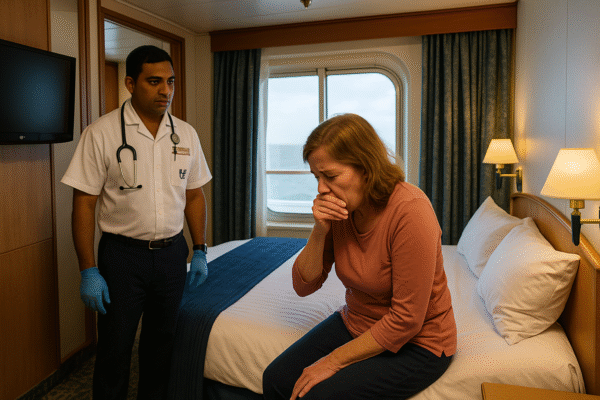In September 2025, Royal Caribbean’s Serenade of the Seas reported a norovirus outbreak during its voyage from San Diego to Miami. The cruise, which included stops in Puerto Vallarta, Huatulco, Puntarenas, the Panama Canal, and Cartagena, saw 71 people fall ill. Among them, 70 were passengers and one was a crew member.
With nearly 1,900 people onboard, the numbers may appear small, but this outbreak marked the 19th gastrointestinal illness reported on cruise ships to the U.S. Centers for Disease Control and Prevention (CDC) this year. That figure has already surpassed the total for 2024.
Passengers reported sudden vomiting, diarrhoea, nausea, and stomach pain. These symptoms disrupted holiday plans, confined many guests to their cabins, and raised concerns about future cruise travel. Families traveling with children and elderly relatives expressed heightened anxiety over exposure to the highly contagious virus.
A Growing Trend Beyond Cruise Ships
While cruise ships often receive media attention, experts stress that they account for only about 1 percent of global norovirus outbreaks. Most cases occur on land in communal spaces such as daycare centers, schools, nursing homes, and restaurants.
Norovirus spreads quickly in confined environments, making ships vulnerable. However, because of strict reporting regulations, outbreaks at sea get tracked more consistently than those on land. The CDC also reported an overall rise in norovirus infections this season across the U.S., suggesting that the surge at sea reflects broader public health patterns.
How Royal Caribbean Responded
Royal Caribbean International moved swiftly to contain the outbreak and reassure passengers. Crew members increased cleaning protocols, disinfected high-touch areas more frequently, and reinforced hygiene reminders across the ship.
Affected passengers went into isolation, and medical teams worked around the clock to provide treatment. Royal Caribbean highlighted that its cleaning operations often exceed international public health guidelines. The company requires passengers to complete health screenings before boarding, comply with onboard monitoring, and report any symptoms immediately.
The Serenade of the Seas medical team offered in-cabin consultations and access to telemedicine, ensuring quick response for anyone developing symptoms. Passengers noticed a higher use of disinfectants and stricter enforcement of hygiene rules throughout the trip.
Passenger Safety Protocols
Travelers can reduce their risk of contracting norovirus by following essential health protocols. Cruise lines and health experts recommend the following:
- Wash hands thoroughly with soap and water for at least 20 seconds, especially after restroom use and before eating.
- Report any symptoms immediately to ship medical staff.
- Cooperate fully with pre-boarding health checks and onboard monitoring.
- Follow all isolation or quarantine instructions if symptoms develop.
- Avoid relying solely on hand sanitizers, as soap and water remain more effective against norovirus.
- Clean and disinfect surfaces and wash contaminated clothing quickly.
- Stick to official shore excursion groups if required by local health regulations.
Self-isolation remains the most effective way to protect fellow travelers once symptoms begin.
Concerns for the Cruise Industry
The 2025 spike in gastrointestinal illnesses onboard ships has already drawn scrutiny from health authorities. More than half of the reported outbreaks this year have been confirmed as norovirus. Health experts suggest that a new strain, coupled with overuse of hand sanitizers instead of soap, may be contributing to the increase.
Despite these challenges, cruises continue to draw millions of travelers each year. The combination of exotic destinations, onboard entertainment, and luxury amenities remains appealing, even as health concerns persist.
Looking Ahead for Cruise Travelers
Norovirus outbreaks remain an unfortunate but occasional part of cruise travel. While the illnesses can disrupt vacations, most cases resolve within a few days without serious complications. Experts advise travelers to prepare with strong hygiene practices, travel insurance, and an understanding of onboard medical protocols.
For Royal Caribbean, maintaining traveler confidence means demonstrating transparency, strict safety measures, and rapid responses during health incidents. Passengers considering cruises in regions like Mexico, Costa Rica, the Panama Canal, and Colombia can feel reassured that protocols continue to evolve with global health trends.
Ultimately, cruises thrive when excitement and safety balance one another. Travelers can still enjoy memorable experiences at sea by staying vigilant, practicing responsible habits, and cooperating with crew instructions. Responsible action builds trust between cruise lines and guests, ensuring that future voyages remain both adventurous and safe.
For more travel news like this, keep reading Global Travel Wire















